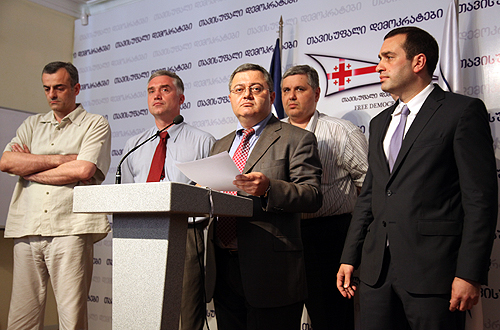| Six Opposition Parties Reject Ruling Party's Electoral Proposals |
| Civil Georgia, Tbilisi / 27 Jun.'11 / 15:41 |

From left to right: Kakha Shartava, leader of National Forum; Zviad Dzidziguri, leader of Conservative Party; Davit Usupashvili, leader of Republican Party; Koba Davitashvili, leader of People's Party and Irakli Alasania, leader of Our Georgia-Free Democrats at a news conference on June 27. Photo: Guram Muradov/Civil.ge
Six opposition parties said in a joint statement on June 27, that they reject a proposal put forth by the ruling party on electoral system reform last week.
Politicians from those parties say that the proposal offers only superficial “façade changes” failing to secure fundamental improvement of the electoral system.
These six parties – Republican Party; Our Georgia-Free Democrats; Conservative Party; People’s Party; Georgia’s Way and National Forum – were part of the group of eight, which had an agreement to speak with one voice with the authorities on electoral-related issues.
Two parties from the group – New Rights and Christian-Democratic Movement – announced on June 27, that they accept the ruling party’s proposal, hence quitting the group of eight.
After laying out its proposals on June 24, the ruling party said that the offer was final and no major amendments would be made in them.
Pavle Kublashvili, a senior lawmaker and ruling party’s chief negotiator on electoral issues, said on June 27 that those willing to join the agreement should sign it at a ceremony at 6pm local time on Monday.
“By doing so the authorities again chose language of ultimatums, political horse-trading; blackmailing and has actually said no to political dialogue,” the six opposition parties said in a joint statement on Monday.
“A principle ‘agree or we will do it in our way anyway’ is unacceptable for us,” the statement says. “Change of electoral environment should be based on improvement of unbalanced electoral system and not on offering money to those parties, which will agree on incomplete proposals. Taking part in such a deal can not be regarded as an agreement between the authorities and political opposition.”
The six opposition parties were referring to one of the clauses in the ruling party’s proposal, according to which a party becoming part of the agreement and clearing 5% threshold in the parliamentary elections, planned in 2012, will receive GEL 1 million to cover its campaign costs. A party, which refuses to join the agreement but manages to clear 5% threshold, will not become eligible for GEL 1 million, according to the ruling party’s proposal.
“We continue struggle for fair elections and change of the government through [elections]. Together we will turn this struggle into a large-scale civic movement for “Free Elections” and achieve victory together with the people,” the six opposition parties said in the statement.
Davit Usupashvili, the leader of Republican Party said, this struggle “will be hard.”
“Together with the people we will manage to achieve an environment wherein the authorities will have to return back to the negotiating table. The struggle will be hard; it would have been better if all of us continued this struggle, but two of our colleagues [referring to New Rights and Christian-Democratic Movement parties] have made their choice,” Usupashvili said.
Irakli Alasania, leader of the Our Georgia-Free Democratic Party, said the ruling party’s proposals were superficial failing to fundamentally change electoral system.
“Unfortunately some of our partners have agreed on these proposals,” Alasania said. “Political struggle, which we will continue, does not exclude any method.”
Leader of People’s Party, Koba Davitashvili, said that offering GEL 1 million to those who would agree on the ruling party’s proposal “is insulting.” “We will not do that,” he said.
“Unfortunately the New Rights and Christian-Democrats failed to resist temptation… It would have been possible to achieve much more in case of maintaining unity,” Zviad Dzidziguri, leader of the Conservative Party, said.
The six opposition parties say that their electoral system proposals mainly center around the offer put forth on April 5. Key point of those proposals were drawing voter registry based on biometric identification system and introducing such electoral system, which will prevent a situation wherein party’s majority in the Parliament is larger proportionally than its overall share of the vote.
